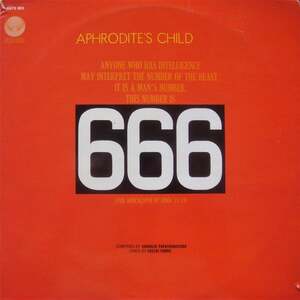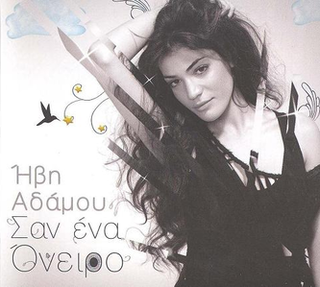
Evángelos Odysséas Papathanassíou, known professionally as Vangelis, is a Greek musician and composer of electronic, progressive, ambient, jazz, and orchestral music. He is best known for his Academy Award-winning score to Chariots of Fire (1981), as well as for composing scores to the films Blade Runner (1982), Missing (1982), Antarctica (1983), The Bounty (1984), 1492: Conquest of Paradise (1992), and Alexander (2004), and for the use of his music in the 1980 PBS documentary Cosmos: A Personal Voyage by Carl Sagan.

Irene Papas is a Greek actress and singer who has starred in over 70 films in a career spanning more than 50 years. She gained international recognition through such popular award-winning films as The Guns of Navarone (1961) and Zorba the Greek (1964). She was a powerful protagonist in films including The Trojan Women (1971) and Iphigenia (1977). She played the title roles in Antigone (1961) and Electra (1962).

Tripoli is a city in the central part of the Peloponnese, in Greece. It is the capital of the Peloponnese region as well as of the regional unit of Arcadia. The homonym municipality has around 47,000 inhabitants.

666 is a double album by psychedelic/progressive rock group Aphrodite's Child, released in 1972. Ostensibly an adaptation of Biblical passages from the Book of Revelation, it is the group's third album and the most critically acclaimed. It would be their final work, due to internal tensions during the recording process and conflict with the record company; by the time it was released, the band had already disbanded and its members had begun work on solo projects.
Rock and roll entered Greece in the middle of the 1960s. Greek rock performers in the field include Pavlos Sidiropoulos, Dimitris Poulikakos. Well known globally Greek rock bands are "Aphrodite's Child", "Socrates drunk the Conium" and "The Last Drive".

Giorgos Alkaios is a Greek recording artist. His career began in 1989 after appearing on a Greek reality show. Following a brief period of stage acting, Alkaios dedicated himself to music. His first single, "Ti Ti", made him popular in Greece. His distinctive musical style fuses Greek and Oriental elements with modern pop music. To date he has been certified with 5 platinum and 9 gold albums. Alkaios represented Greece in the Eurovision Song Contest 2010 with the song "OPA", and placed 8th in the Final.

21os Akatallilos is the eighth studio album by Greek pop sensation Sakis Rouvas and his second produced by Vangelis Yannopoulos, for Minos Emi. The album was released on 9 April 2000 in Greece and Cyprus, and debut at number one on the charts. As opposite to his former release Kati apo mena, there is no composition or any contribution by George Theofanous. Main composer was Stratos Diamandis and these songs were his first ever released. A tough bet taken by Sakis' producer, Vangelis Yannopoulos. Other remarkable contributions were the ones of two cult Greek bands Maskes and Ammos, plus the lyrics written by Greek actor star, Lakis Lazopoulos, and Greek lyricist Aris Davarakis. This album was Rouvas' fastest selling album ever since the beginning of his career. The dramatic instrumental introduction part of "Andexa" featured, for many years, as the musical motto of all his live appearances. On track 6 "Stin mama sou", backing vocals are provided by his then manager Elias Psinakis and his then producer Vangelis Yannopoulos, by composer Stratos Diamandis and by other fellows who happened to be present at that moment in the studio premises... and were invited within the vocal booth.
Vangelis is a Greek composer and performer. He gained wide popularity after composing soundtracks to Chariots of Fire (1981) and Blade Runner (1982).
The Dance of Osman Taka ; Greek: Οσμαντάκας or Σαμαντάκας) is a traditional dance in Albania and Greece. In Albania it is mainly danced by Cham Albanians. The dance bears the name of Osman Taka, a 19th-century Muslim Cham Albanian guerilla fighter who fought against Ottoman forces. It is a famous variation from the Albanian Cham repertoire of the older Çamçe dance.

"Theleis I Den Theleis" is a song released by Greek singer Sakis Rouvas in May 1998 by Minos EMI, written by composer Giorgos Theofanous with lyrics by Vangelis Konstantinidis, and produced by Vangelis Yannopoulos. It was released in Greece and Cyprus as a four track CD single. MAD TV ranked it as the best song of 1998.

Pio Konta is the second album released by Greek singer Kostas Martakis, released in Greece and Cyprus on 12 November 2009 by Universal Music Greece. The album has eleven songs in total, including two English language songs. Furthermore, five songs were recorded and produced at Lionheart Studios in Stockholm, Sweden. The album went gold within four days of its release, and was later certified platinum.

San Ena Oniro is the first studio album by Greek Cypriot singer Ivi Adamou, released in Greece and Cyprus on 22 July 2011 by Sony Music Greece. The album was re-released as a "Euro Edition" featuring the three songs that Adamou competed with in the Cypriot national final for the Eurovision Song Contest 2012, as well as a Greek-language version of one of the songs.
Marianna Chantelle Hansen, known professionally as Shaya, is a Greek singer of Danish, Inuit, Guyanese and Native American descent. Shaya was a member of the girl band Hi-5, the result of the Greek version of the talent show Popstars. She is currently pursuing a solo career and finished fifth in Greece's version of Dancing on Ice.

Dust of Time is a soundtrack album by Greek composer Eleni Karaindrou featuring music for the film The Dust of Time by Theodoros Angelopoulos recorded in 2008 and released on the ECM New Series label.
Kostas Tournas is one of the pioneers of modern Greek rock. He is a singer and composer of many hits in the '70s including Ti Na Mas Kanei I Nychta.

Popi Malliotaki is a Greek pop-folk singer. According to her official website, she was born on 16 October 1971.

Klejdi Llupa, professionally known as Claydee, is a Greek-Albanian singer, songwriter and producer. His song "Mamacita Buena" became the first Spanish pop song on YouTube to receive more than 27,000,000 views within a year after its release. He has produced works that fall into the dance-pop, RnB and house music categories.

Giannis Haroulis is a Greek singer, songwriter and lute player. He plays a mixture of Greek folk and traditional Cretan music infused with rock elements and modern sounds.

Rapsodies is an album of Greek songs by Irene Papas and Vangelis, featuring music and text based on Greek Orthodox liturgical chant,with two tracks composed by Vangelis. Recorded in Nemo studios, London 1986, the entirety of the album is performed and produced by Vangelis with Irene Papas' lead vocals. First issue of the album on compact disc was in Greece only . A remastered edition was released by Universal Music in 2007.

Songs of Theodorakis is an album by the Greek actress and singer Irene Papas. She sings eleven songs, all in Greek, written by the Greek songwriter and composer Mikis Theodorakis. The album was first issued in 1968 by RCA Victor. RCA Victor also released it in France in 1969. Anodos released it in Greece in 1990 as Ειρήνη Παππά | Σε Ένδεκα Τραγούδια Του Μίκη Θεοδωράκη. It was remastered and reissued on CD in 2004 by FM Records as Irene Papas Sings Mikis Theodorakis. All the tracks in the album were recorded in a concert that Papas gave in New York in 1969. The music was conducted by Harry Lemonopoulos. The album was produced by Andy Wiswell, who also wrote the liner notes. Both Papas and Theodorakis had gone into exile when the military junta came to power in Greece in 1967. The New York Times critic Clive Barnes said of her performance that "Irene Pappas is known to the public as an actress, but that is why she sings with such intensity, her very appearance, with her raven hair, is an equally dynamic means of expression".















